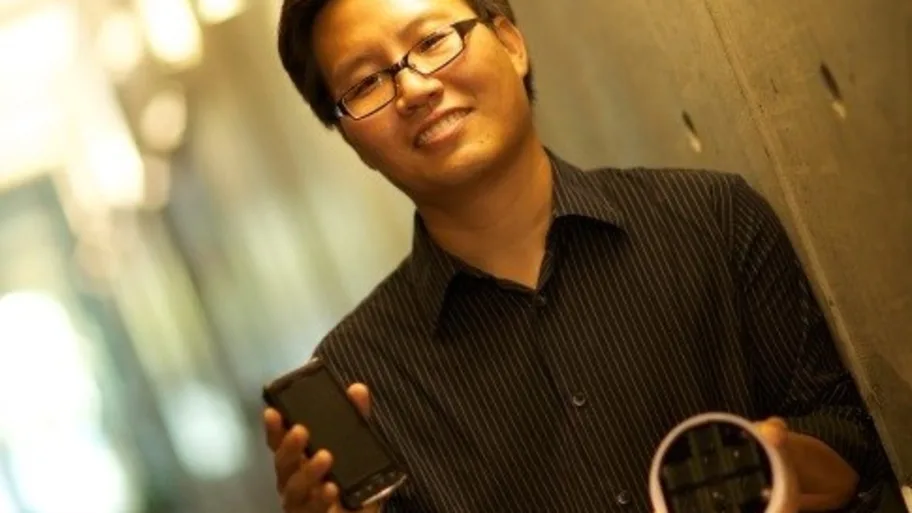
- Science news
- Frontiers news
- 30th anniversary of Chemistry Nobel Prize celebrated with new section
30th anniversary of Chemistry Nobel Prize celebrated with new section
New specialty section on Supramolecular Chemistry is to be led by Specialty Chief Editor, Professor Tony James.

Professor Tony James (Specialty chief editor) with Professor Sir Fraser Stoddart
We are delighted to announce the launch of our newest specialty section on Supramolecular Chemistry within Frontiers in Chemistry.
The section will be headed by Specialty Chief Editor Professor Tony James of the University of Bath, and comes exactly 30 years since the field was recognized with a Nobel Prize in Chemistry. Presented to Donald J. Cram, Jean-Marie Lehn, and Charles J. Pedersen, the 1987 Nobel Prize for Chemistry was a recognition of their seminal contributions to field and their involvement in the development of host-guest chemistry.
The award was made possible by the discovery of the crown ethers by Pedersen in 1967. This serendipitous discovery opened the door for Cram and Lehn to express their creativity in distinctive ways and fully develop the area of Supramolecular Chemistry.
This was such a notable moment that Professor James argues the definition proposed by Jean-Marie Lehn in his Nobel Lecture still holds true today:
“Supramolecular chemistry may be defined as “chemistry beyond the molecule.”
More recently in 2016 the Nobel Prize for Chemistry was awarded to Jean-Pierre Sauvgage, J. Fraser Stoddart and Ben. L. Feringa for their work in the fledgling area of molecular machines. While the area is primarily molecular in nature — supramolecular chemistry was fundamental in bringing the mechanical bond into existence. In particular Sauvgage and Stoddart used supramolecular chemistry as a tool to help create mechanical bonds, resulting in molecules that can behave as shuttles, switches, rotors, motors, and machines.
“Much of the new chemistry relating to complex networks and non-equilibrium systems across all length scales in the next half century is going to find its origins in the principles that define supramolecular chemistry. The stage is now set for the next generation of chemists to tackle big problems in science that will lead to the creation of forms of life other than those with which we are already familiar. The opportunity for chemists to occupy center stage in addressing the world’s needs in contexts such as energy harvesting and storage as well as guiding humanity towards being able to control sustainable environments all across the globe will be rooted in the tenets of supramolecular chemistry. The creativity that we can bring to the fore as chemists will earn us a level of respect amongst our fellow human beings that will be second to none. Chemistry will become one of the most influential, as well as rewarding and satisfying, endeavors the world has ever witnessed.”
Professor Sir Fraser Stoddart (@sirfrasersays)
Many thanks for these truly inspiring words. This year has had many important Supramolecular Anniversaries’ including your 75th birthday — many happy returns –from all of us at the Supramolecular Section of Frontiers in Chemistry.
The field of Supramolecular Chemistry continues to expand, and while this section seeks to actively grow alongside and advance these new developments, it will not lose sight of the bedrock of Supramolecular Chemistry either. As Specialty Chief Editor Professor James welcomes papers on all aspects of supramolecular chemistry, including uncharted areas:
“My overarching desire is to progress the area of Supramolecular Chemistry while always remaining open to ‘opportunities for alternatives’.”
Professor James’s vision for the section is to create the go-to place for all supramolecular chemists. To achieve this status, he does not wish to impose restrictions on what constitutes supramolecular chemistry. He champions Open Access believing access to the latest, most important scientific discoveries should be freely available for everyone.
“The advancement of science requires that the results from which the advancement builds are freely available.”
Supramolecular Chemistry is now ready to welcome high-quality submissions and Research Topic proposals.






